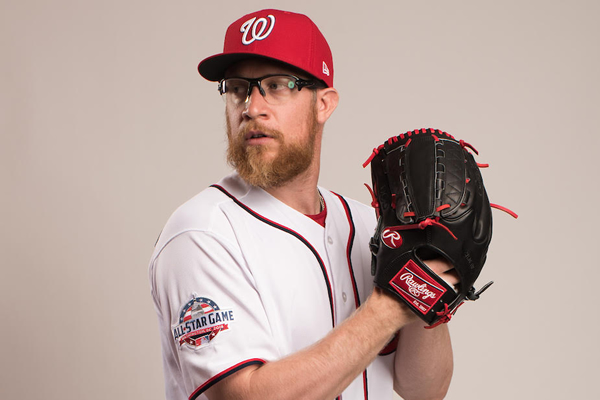a&e features
Sean Doolittle: The all-around All-Star
Nats pitcher, wife on life in D.C., their LGBT advocacy — and whether the team is ready for a gay player
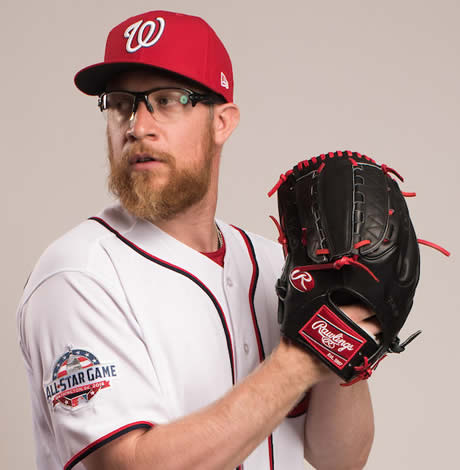
Ace relief pitcher Sean Doolittle was traded from the Oakland Athletics to the Washington Nationals in July of 2017. He eloped with his then-girlfriend, Eireann Dolan one day after the regular baseball season ended last year. Doolittle was named a 2018 All-Star this week; he was a member of the 2014 MLB All-Star team and this season is rounding out to be one of the best of his career.
Doolittle and Dolan received national attention in 2015 when they purchased hundreds of tickets to the Oakland Athletics Pride Night after the event received backlash from fans. The tickets were donated to local LGBTQ groups and an additional $40,000 was raised.
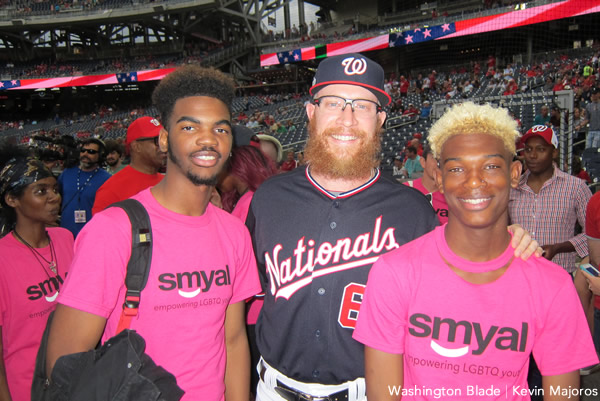
Sean Doolittle on the field with members of SMYAL at Night Out at the Nationals. (Washington Blade photo by Kevin Majoros)
Local LGBTQ youth leadership and housing program, SMYAL, has caught the attention of Doolittle and Dolan and they donated 52 tickets to the organization for Night OUT at the Nationals last month. Going a step further, they stopped in personally to deliver the tickets at the SMYAL youth program’s headquarters and the SMYAL transitional housing program.
The Washington Blade sat down with the couple inside Nationals Park for a conversation about the LGBTQ community, life in D.C., baseball and music.
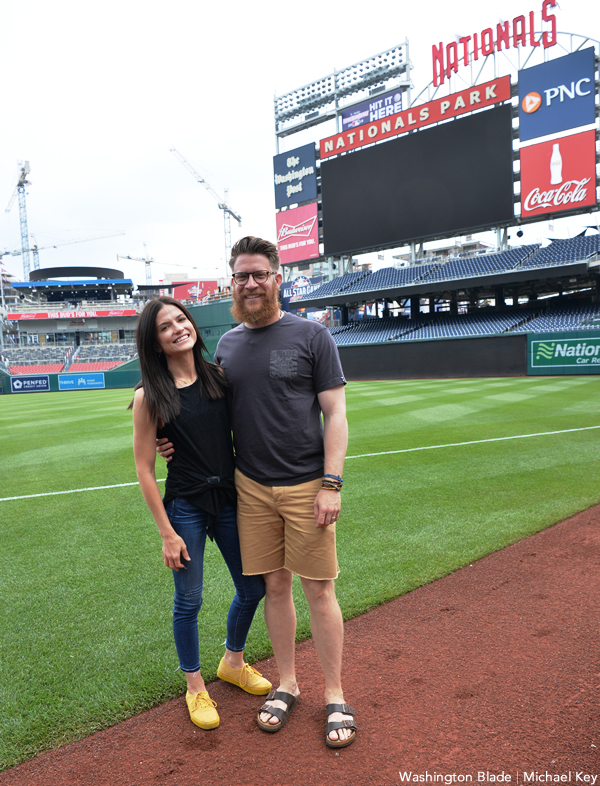
Eireann Dolan and Sean Doolittle (Washington Blade photo by Michael Key)
Washington Blade: You’re both active with charitable causes including work with Syrian refugees and military veterans’ mental health and housing. How did you become interested in the LBGTQ community?
Eireann Dolan: I have two moms. But even if I didn’t, I think this is something that’s really important. It’s always been really important, at least in my family. And something that we’ve always valued is the idea of having an accepting place. Having a sense of home. It factors into all the charity work that we do, all of the community work. We work with the UN Refugee Agency, UNHCR. We’re going to have about 30 refugees coming to the game tomorrow night.
Blade: That’s incredible.
Dolan: Yeah, so we’re going to have them on the field and they are veterans who are injured or widowed. We deal with housing for them. Our theme seems to be a sense of home. Making sure people feel welcome. Whether they’re a refugee, whether they’re a veteran returning or transitioning back into civilian life, or whether they’re somebody in the LGBTQ community who maybe hasn’t considered that sports would be a space for them. We want to make sure that they know it is a space for them. They do have a home here and we accept them as they are. It’s always been really important to us.
Blade: And then you stumbled upon SMYAL here in D.C.
Dolan: We did. Well, it kept getting name dropped to us so many times by so many people.
Doolittle: In advance of the Nationals Pride night, we wanted to get involved. We wanted to do something more than catch the first pitch or meet some people on the field before the game. And we love this community, we love being here, and we wanted to give back. And like she said, in some of the meetings we had with the folks here, with the Nats, SMYAL had been referenced several times. We were able to make a couple visits over there before Pride night.
Dolan: That was incredible.
Doolittle: It’s an incredible organization and the holistic approach that they take, helping with everything from housing to leadership to education to helping people become voices in their communities.
Dolan: That was the biggest thing, I think.
Doolittle: And then coming back. They go through the program and then they come back to SMYAL to give back and pay it forward. That was something that we found to be incredibly inspiring. And if, through this process, we can lift their voices up and help tell their stories, that’s what we’re trying to do.
Blade: Do either of you have any thoughts as to why Major League Baseball has never had an openly gay player? There seems to be upper management support, team player support and fan support.
Dolan: There’s a lot of hesitation for any athlete, and baseball particularly, to share a lot of their private life, just full stop. Baseball is a bit more buttoned-up. The players themselves are not marketed in such a way, or they don’t maybe market themselves in such a way that talks about their personal life. You look at basketball, you look at football, you look even at hockey. You know the spouses. You know the families. You know what they do. You know where they’re from. But in baseball, it’s a little bit different. I think that may contribute to it, but that, I don’t think is the answer entirely.
Doolittle: I do think there is growing support, like you talked about. I think Major League Baseball’s taken steps towards it. I still think there are steps that need to be made in educating more people. I think as we continue to make it a better space, a more accepting space, we can continue to get rid of all this toxic masculinity bullshit that happens in a locker room.
Blade: Does it happen here with the Nationals?
Doolittle: Of course it happens. It’s performative. Sometimes that’s a guy’s way of psyching themselves up to go play. But I think we’re seeing less and less of it, and it’s fallen by the wayside. We just need to be continuously focused on creating a space that’s accepting. When you’re with these guys in such close proximity over six, eight months over the course of the season, guys should be OK with being themselves. Whether it’s you’re gay or whether it’s a different religion, or you’re from a different country. We have guys in here from how many different countries? How many different religious backgrounds? So I think just continuing that evolution in the clubhouse.
Dolan: That sports era of the ’90s, early 2000s of hyper-masculine, almost borderline toxic masculine, alpha, humiliate your opponent, keep your head down, don’t look like you’re having fun. That’s waning because fans want fun. They like the back flips. They like the personality. And you’ve got guys out there, you’ve got little pockets of people showing their personality.
Blade: Do you think this team is ready for a gay player?
Doolittle: I don’t know. And that’s the thing, I don’t think we’re going to know until that happens. I wish I had a better answer.
Dolan: I think baseball is ready and I think clubhouses know if a guy can help your team, period, the end. Doesn’t matter.
Blade: What’s your take on the NFL’s anthem protest?
Dolan: It’s not an anthem protest, that’s my first thing. They’re not protesting the anthem, they’re protesting the violence against young African-American men, particularly.
Doolittle: I think the NFL’s response was incredibly dangerous and disgusting. You’re punishing guys by policing peaceful protesting. I think it sends a really bad message across the United States.
Dolan: And if you say no politics in sports, then how do you explain flyovers that you do before games? How do you explain all the active recruiting that they do for the military during games? Why are we picking and choosing? When you’re telling young African-American men, “We want to watch you, we want to watch you do this particular thing, but don’t talk,” that just smacks of something that I thought this country had moved past.
Doolittle: I think it could have been a relatively short-lived story with a much better ending if, initially, they had focused their energies on listening and trying to figure out a way to get guys to stand. So when Kaepernick starts kneeling, they start listening to his message. They help him get involved to focus that message into action in the community. And soon enough, we have guys that are proud to stand up for the anthem because they’re helping their communities and bettering people and remedying the situation. And I think, unfortunately, it’s been used as something in this culture war that we’ve seen. These guys have done a lot of incredible work in their communities. They’ve met with government officials, they’ve done a lot of outreach with law enforcement in their communities. They are backing it up with significant action. So I wish everybody felt good enough and proud enough to stand for the anthem without being told that they had to do so.
Blade: Would you go to the White House if the Nats win the World Series?
Doolittle: People have asked me that before, and you don’t get to answer that question unless you win the World Series
Dolan: We’ll talk to you in October.
Blade: As a relief pitcher, you’re either the hero or the goat. How do you deal with that on a daily basis? Do you have stress techniques?
Doolittle: I’ve gotten a lot better at it over the last couple years. Early in my career, I pitched with a lot of emotion and I put a lot into, like you said, whether you’re the hero or the goat in that scenario. There’s no gray area in that line of work. There’s no, well I thought I executed my pitches really well, I just didn’t get the results I wanted. That’s not a great consolation prize for you or the other 24 guys on your team.
Dolan: And the fans don’t want to hear it.
Doolittle: Yeah, and it’s tough to explain that away. I was very attached to how I was pitching, and if I was getting the job done. If I didn’t get the job done, that was a blow to my self-esteem. Over the last few years, I worked a lot at processing the outings, mentally preparing for the outings, changing the way that I use that energy. I used to pitch with a ton of emotion. Now, I use the energy to hyper focus. I want to calm things down. I want things to be slow and smooth.
Dolan: You’re very Zen.
Doolittle: I think it’s helped me manage a lot of that stress. It’s not always easy, but it’s an occupational hazard.
Blade: Your stats this year are amazing and…..
Dolan: Don’t say them, don’t say them, don’t say them.
Blade: All right. Don’t say them out loud?
Dolan: No. We’re very superstitious.
Blade: Are the stats that shall not be named a result of your comfort level in D.C. or are you doing something different in training?
Doolittle: I feel very comfortable in D.C. We love it here. I changed some things. But a lot of it was behind the scenes. We changed a lot with the arm care program that I have. I dealt with some shoulder injuries in the past, when I was with Oakland, and I missed some time on the disabled list, and I think sometimes, just getting a fresh set of eyes or a new way of explaining things, really helps. And we added some things to that program, to the daily routine. I feel strong. I feel, at this point in the season, even with the work load I’ve had, I feel really good about where my body’s at, and I think when you don’t have to worry every day about, how’s my arm going to feel when you come to the field, you can throw yourself into focusing on your outing and who you might face rather than focusing on trying to get your body ready to pitch. So that’s been a load off my shoulders, pardon the pun.
Dolan: Did you catch the eye roll on the recording? Was it loud enough?
Blade: You had an unusual path to becoming an MLB relief pitcher. You pitched growing up and also played first base at University of Virginia. And then, you were drafted by the Oakland Athletics as an outfielder and a first baseman. Is this where you were supposed to be the whole time? There was a little side path.
Doolittle: I feel like it is. It’s a lot easier for me to say this now, but I’m glad I went through that transition process. There were some really dark times. I missed three full seasons on the disabled list in the minor leagues.
Dolan: So close to getting a call up, too. He was right on the cusp.
Doolittle: And before I got hurt the first time in 2009….
Blade: As a first baseman?
Doolittle: As a first baseman, yeah. It’s totally shifted my perspective on everything. This almost didn’t happen at all. In 2011, I had contacted my agent to go back and try and figure out the process of re-enrolling in college, because I was that far at the end of my rope. And the A’s came to me and said, “Hey, would you like to think about pitching?” I joke that I took the scenic route to the big leagues. It makes me appreciate every day that I get to wear that little logo on the back of my hat that says I’m in the big leagues. It came really close to never happening.
Dolan: There’s something to be said about having experienced adversity and failed. I don’t think I would be with him if he was this super successful player. I don’t think I would have been drawn to him.
Doolittle: Right, you learn a lot of humility, you learn a lot about yourself.
Dolan: Yeah. If you’d been that first round pick that you were, superstar first baseman….
Doolittle: I was the man.
Dolan: You were the man.
Blade: You prefer him damaged?
Dolan: That’s right up my alley. Who else is going to humble him, honestly?
Blade: What are you liking about living in D.C.?
Doolittle: It’s an awesome city. There’s a good energy, there’s a creative energy, it’s very diverse, it’s very accepting. The sense of community, the pride of being from D.C., that’s a thing that we found that I think was really cool. There’s a lot that we like about it.
Dolan: It’s amazing. We love the local bookstores and local record shops. We love just discovering new, cool spots that we can hit up every time we have a spare hour or so.
Blade: What about the excitement of MLB All-Star Week being in the town where you’re now pitching?
Doolittle: I think it’s awesome. I think us players, we’re starting to feel that buzz and that energy surrounding it. I’m excited for the Nationals fans and the organization, because they’ve done everything so first class. There’s a good energy surrounding D.C. sports now, and I think to bring the best players from around baseball here to D.C., that’s going to be really cool.
Blade: Has the Stanley Cup win by the Washington Capitals affected the team in any way?
Doolittle: We definitely followed it as a team. Before or after our games, whenever the Caps were playing, the TVs in the clubhouse were on. We were following it on our phones, or any chance we could, we were watching the game. We were all in, and I think it was great for us because they gave us the blueprint. They showed us how it’s done. They’ve had a similar storyline. They’ve had to answer a lot of the same questions we’ve had to answer after having really successful, regular seasons, but not making the deep run into the playoffs. They’ve had to answer the questions, is this the year you get over the hump? How are you guys going to break through?
So to see them do it, and to see them break through and not stop, and keep going. It was really fun. And when they came here, that was the biggest thing that they said. It was really cool to share that experience, just for a little bit, with the Cup, in the locker room and on the field.
Even though it’s a different sport, that energy, you can feel it. We’ve had Champagne celebrations before, and once you get a taste of that, you want more. And that’s really motivating, to have another team in your city bring in a trophy like that.
Dolan: And to see the parade and the reaction from the fan base. This is a sports city. And I don’t think people give it enough credit for being the sports city that it is. It was a nice taste.
Blade: Sean, you are a Star Wars fan and your Twitter handle is Obi-Sean Kenobi. Was the Solo movie a win or lose for you? Did you go in costume?
Doolittle: I loved it and we didn’t go in costume this time. We were in Miami, so we were on the road. But we did see it opening night.
Dolan: It was really hot there; a Chewbacca costume would have been difficult.
Doolittle: Yeah. And I don’t know if I can pull off a Princess Leia bikini.
Dolan: Not to say we haven’t tried. There’s your cover picture.
Blade: What’s on your music playlist right now?
Doolittle: I’m a metalhead. I was raised on the sounds of Black Sabbath and Ozzy, AC/DC and Metallica, and my love for it grew from there. When we were kids, we would be going to a Little League game. I’d be nine years old and we were rolling up in the minivan, blasting Black Sabbath.
Dolan: Oh, bad, bad. Love it.
Doolittle: There’s a band from Texas called Power Trip. They’re new but their sound is very ’80s thrash, which I really dig. There’s another band call Chemist. It’s called doom metal. It’s a lot slower and they have some good stuff. I really only listen to it when I’m at the field. When we’re at home, it’s a lot more mellow.
Dolan: We’re pretty eclectic at home. It’s not all metal for us. We like a lot of the new Nashville sound. I’m not a huge country fan, but Sturgill Simpson and….
Doolittle: Jason Isbell.
Dolan: And Colter Wall, yeah. A lot of that is really good. And I love hardcore gangster rap, honestly. I’m not going to lie, it’s my weakness. When he’s pitching, I put on noise canceling headphones and blast gangster rap. Tupac or Biggie, and it works. It calms my nerves because there’s something about it.
Blade: There are nerves for you while he’s pitching?
Dolan: I don’t watch, no. I haven’t watched him pitch live in years. I’m too superstitious.
Blade: Give me a quirk about the other person that makes you laugh.
Doolittle: Oh my god.
Dolan: He has a tactile thing about mesh.
Doolittle: It’s very soft.
Dolan: He likes to touch mesh.
Doolittle: Quirks that make me laugh….
Dolan: Careful, careful.
Doolittle: Well the aforementioned noise canceling headphones, she likes them so much that she’s taken to wearing them in the shower.
Dolan: They’re large speakers and I have three separate shower caps.
Doolittle: She took 45 minutes in the bathroom recently and I was like, what is going on? I was knocking on the door. She didn’t hear me.
Dolan: I bought a deep conditioner mask. Listen, this hair doesn’t get like this on its own.
Blade: Sean, we need to get you to practice. Let’s grab a photo first.
Dolan: Cool.
Doolittle: Oh, cool.
Dolan: All right. Don’t forget your dry cleaning, Sean. We want that front and center in frame.
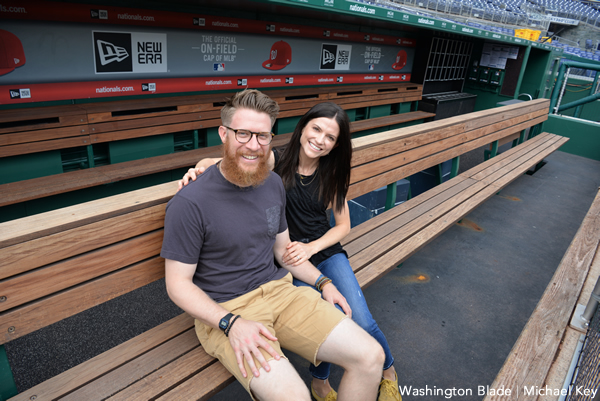
Sean Doolittle and Eireann Dolan (Washington Blade photo by Michael Key)
a&e features
MISTR’s Tristan Schukraft on evolution of HIV prevention
From ACT UP to apps, embracing stigma-free care
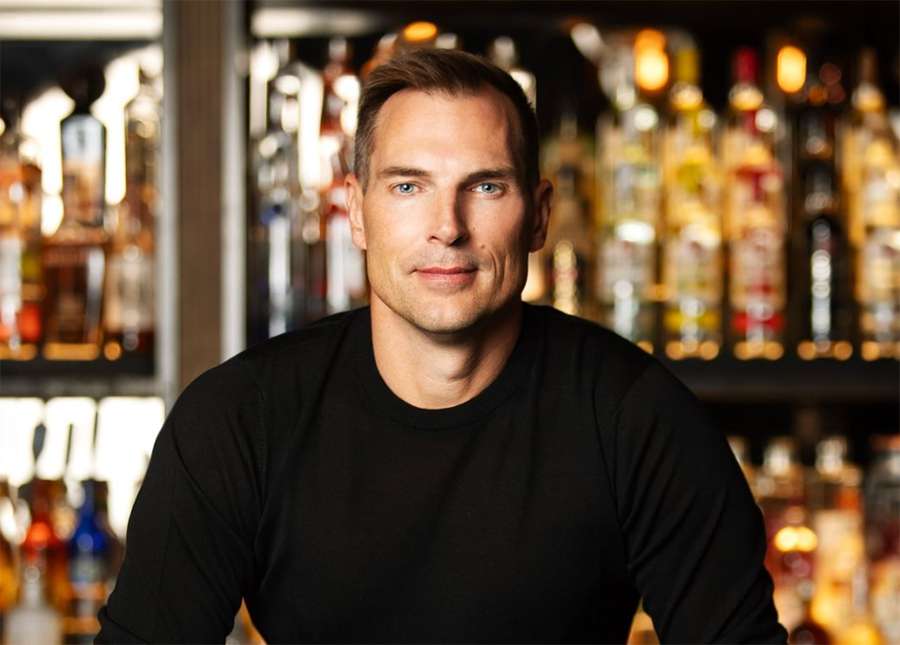
It was not too long ago that an HIV diagnosis was read as a death sentence. In its earlier decades, the HIV/AIDS crisis was synonymous with fear and loss, steeped in stigma. Over recent years, open conversation and science have come together to combat this stigma while proactively paving the way for life-saving treatments and preventive measures like PrEP. Now, in 2026, with discreet and modern platforms that meet people where they’re at in their lives, HIV prevention has evolved from hushed words of warning into something far more sex-positive and accessible. Game-changing services like MISTR are a testament to this shift, showing our community that healthcare doesn’t have to feel clinical or shaming to work. It can be empowering and, dare I say, celebratory.
Few people embody this evolution quite like Tristan Schukraft, founder of MISTR. With one hand in healthcare and the other high-fiving through queer nightlife, Schukraft gets that, from the bar to the bedroom and beyond, prevention happens in person and in real life. His approach has helped turn PrEP, DoxyPEP, and testing into normalized parts of our daily queer life, reaching hundreds of thousands of people across the US.
In our conversation, Schukraft shares candidly about stigma, policy, and why the future of sexual health depends on keeping it real.
BLADE: You have one hand in healthcare and the other in nightlife and queer spaces. Can you share with us how these two spheres impact and inform each other? How do they impact and inform you?
SCHUKRAFT: Honestly, for me, they’ve never been separate. Nightlife and queer spaces are where people meet, date, hook up, fall in love, and make friends. That’s real life. Being in queer spaces all the time keeps me grounded and reminds me who we’re building MISTR for.
BLADE: MISTR markets sexual health in a sex-positive, stigma-free fashion. Can you share with us how you measure the impact of this approach?
SCHUKRAFT: This year, we held the first-ever National PrEP Day. Dua Lipa performed, and Cardi B was there. After the event, Cardi B went on her Instagram live to encourage people to sign up for PrEP.
When you make sexual health stigma-free and sex positive, people talk about it. We see it in how people use the platform. When 700,000 people are willing to sign up, get tested, start PrEP, and add things like DoxyPEP, that tells us we’ve made it feel safe and normal instead of scary or awkward. And then we see it in the results. Since we expanded DoxyPEP, STI positivity among our patients dropped by half.
BLADE: How have you seen the conversation of sexual health in our LGBTQ+ community change in mainstream culture in recent years?
SCHUKRAFT: Ten years ago, nobody was casually talking about PrEP, and if they did, it likely referenced one being a Truvada whore. Now it’s part of the culture. Popstars like Troye Sivan post pictures of their daily PrEP pill on social media. Cardi B goes on Instagram Live telling people to get on PrEP.
For many sexually active gay men, taking PrEP is simply part of the gay experience. For people in more remote areas, it might not be as talked about. Particularly in rural or more conservative places, MISTR can be a life-changing option. No awkward visits to the family doctor or the local pharmacy where everybody knows your business. It’s all done discreetly online and shipped straight to your door.
BLADE: You have publicly argued that cuts to government HIV prevention funding are of high risk. Would you please elaborate for us on what those budget decisions mean on an individual level?
SCHUKRAFT: It means real people fall through the cracks. Someone doesn’t get tested. Someone waits too long to start PrEP. Someone finds out they’re HIV-positive later than they should have. Community clinics will be the hardest hit, especially those in underserved communities. The good news is that MISTR is ready to help people who might lose their access to care. All you need to do is sign up at mistr.com, and it’s totally free with or without insurance.
BLADE: From your (and MISTR’s) perspective, how do these funding cuts threaten ongoing efforts to end the HIV epidemic?
SCHUKRAFT: For the first time, we have all the tools to end HIV. If everybody who is HIV negative is taking PrEP and everyone HIV+ is virally suppressed, we can end all new HIV transmissions in the United States. We have everything we need today. All we need is to get more people on PrEP. Cutting funding risks losing that momentum. Ending HIV requires scale and consistency. Every time funding gets cut, you lose momentum, trust, and infrastructure, and rebuilding that takes years.
HIV transmissions don’t pause because budgets change.
BLADE: In our current climate of decreased federal investment, what role do you feel private healthcare and business should play in sexual health?
SCHUKRAFT: With reports that the current administration is considering cuts to HIV and prevention funding, we face a moment of reckoning. At the same time, some employers are seeking to exclude PrEP and HIV prevention from their coverage on religious freedom grounds. If these challenges succeed, and if federal funding is slashed, the consequences for public health will be devastating. But this is where the private sector must step up to fill the gap, bridge divides, and deliver results.
Businesses have the power and platform to normalize HIV prevention and drive measurable outcomes. At MISTR, we see firsthand what’s possible: since introducing DoxyPEP, STI positivity rates among our patients have been cut in half. But it’s not just about medication. It’s about messaging.
Our sex-positive, stigma-free marketing speaks directly to our community, making sexual health part of everyday life. No awkward doctor visits, no needles, no paperwork — just free online PrEP and STI testing, prescribed by real physicians and delivered to your door. That kind of impact could grow exponentially if more employers embraced this approach and made HIV prevention part of their employee wellness programs.
Employers, this is your call to action. Start by making sure your health plans cover PrEP and DoxyPEP. Partner with platforms like MISTR to give employees private, stigma-free access to care. Offer on-site testing. Talk openly about sexual health, not just during Pride, but every day of the year. This is not political — this is about protecting lives, strengthening communities, and building a healthier, more productive workforce. Because healthy employees aren’t just good for public health — they’re good for business.
When the private sector steps up, outcomes improve. And when businesses align with platforms like MISTR, scaling impact isn’t just possible — it’s happening.
BLADE: Has MISTR experienced any direct effects from these recent shifts in public health funding?
SCHUKRAFT: MISTR’s unique model is totally free for patients with or without insurance, and we don’t cost the government or taxpayers a penny. We are scaling up our efforts to reach people who might be losing their access or care.
BLADE: What would be your message to policymakers who are considering further cuts to HIV/AIDS programs?
SCHUKRAFT: During his first term, President Donald Trump committed unprecedented resources to the Ending the HIV Epidemic initiative here at home. Bipartisan support has shown what’s possible when bold leadership meets smart strategy. To policymakers: I urge you to reconsider any cuts to HIV prevention funding. This is not the time to pull back. It’s the time to push forward. Ending HIV is within reach — but only if government, private industry, and community organizations stand together.
BLADE: What is one perhaps overlooked win from last year that impacted you on a personal level?
SCHUKRAFT: Seeing our STI positivity rate drop by half after expanding DoxyPEP.
BLADE: Looking at the year ahead, what are MISTR’s most significant priorities for sexual health in 2026?
SCHUKRAFT: Expanding access, especially in the South and in communities that still get left out. Rolling out injectable PrEP. And just continuing to make sexual healthcare easier and more normal.
a&e features
Visible and unapologetic: MAL brings the kink this weekend
Busy lineup includes dances, pups, super heroes, and more
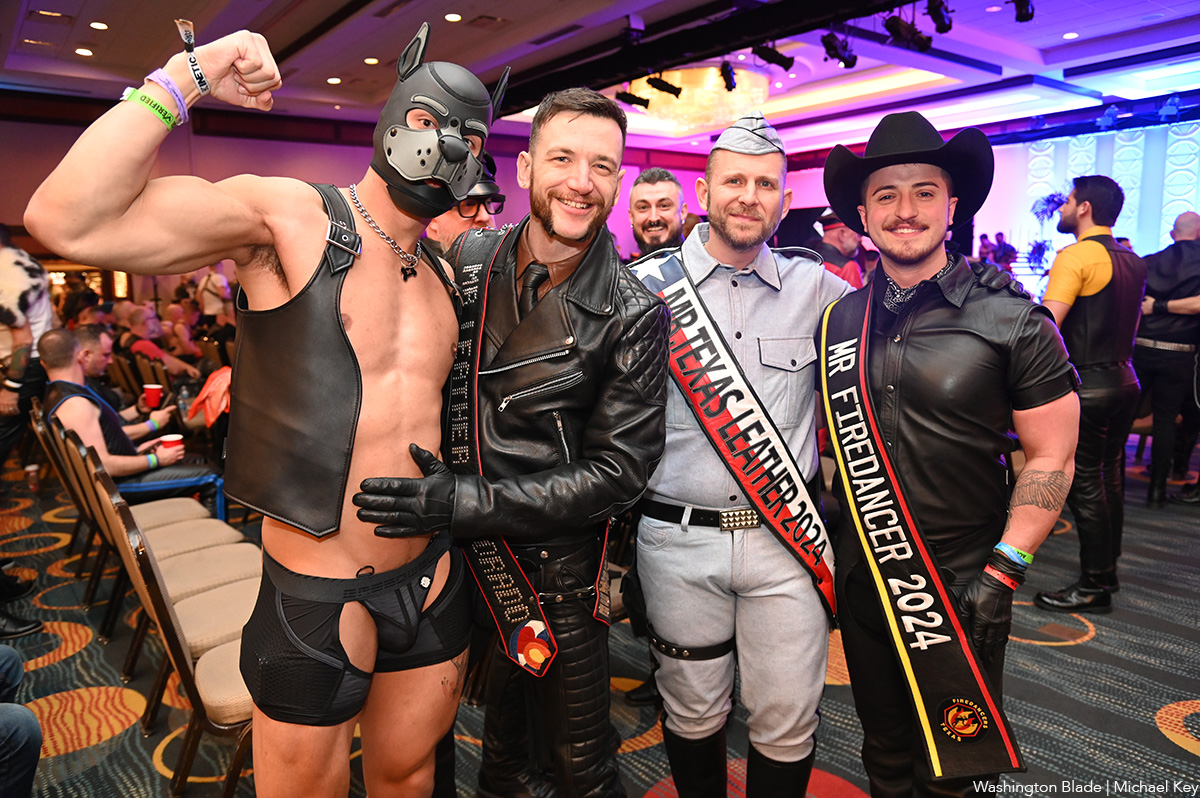
MLK Weekend in D.C. brings the annual Mid-Atlantic Leather (MAL) Weekend. Just a short walk from where Congress has been attacking queer Americans this year, MAL takes place at the Hyatt Regency Washington for several days of intrigue, excitement, leather, and kink.
The Centaur Motorcycle Club — one of several similar groups dedicated to leather in the country — has been hosting MAL in its current form for more than 40 years. Originally a small gathering of like-minded people interested in the leather lifestyle, MAL has grown to include a full four days of events, taking place onsite at the Hyatt Regency Washington (400 New Jersey Ave., N.W.). Select partner happenings take place each night, and many more non-affiliated events are scattered across the DMV in honor of and inspired by MAL.
MAL Weekend has become an internationally renowned event that celebrates fetish culture, yet it also raises funds for LGBTQ organizations, “reinforcing its legacy as both a cultural and philanthropic cornerstone of the global leather community,” according to MAL organizers.
During the day, MAL events at the Hyatt include workshops, social gatherings, shopping, and other in-person engagements for the community.
“The Hyatt underwent an extensive top to bottom renovation after last year’s event,” says Jeffrey LeGrand-Douglass, the event chair. The lobby, meeting spaces, guest rooms, and other areas have been updated, he notes, “so I am very excited for our guests to experience the new design and layout for the first time. And of course as with every year, we look forward to the contest on Sunday afternoon and seeing who will become our new Mr. MAL.”
In the evening, MAL hands the reins to partner KINETIC Presents, the D.C.-based nightlife production company. KINETIC will host four consecutive nights of high-production events that fuse cutting-edge music, immersive environments, and performance. This year, KINETIC is popping open doors to new-to-MAL venues, international collabs, play zones, and a diverse lineup.
According to KINETIC managing partner Zach Renovátes, 2026 is the most extensive MAL production to date. “The talent lineup is unreal: an all-star roster of international DJs, plus drag superstar performances at the Saturday main event,” he says.
Renovátes added that he’s “most excited about the collaborations happening all weekend — from bringing in MACHO from WE Party Madrid, to teaming up with local leather groups, to nonprofit partners, and Masc Diva [a queer nightlife collective].”
Official MAL events begin on Thursday with the Full Package/Three Day Pass Pick-Up from 5:30-8:30 p.m. at the Hyatt.
Thursday night is also the KINETIC kickoff party, called LUST. Running 10 p.m. – 3 a.m., it’s being held at District Eagle. DJ Jay Garcia holds it down on the first floor, while DJ Mitch Ferrino spins in the expansive upstairs. LUST features special performances from the performers including Serg Shepard, Arrow, Chase, and Masterpiece.
Renovátes notes that the LUST opening party at District Eagle coincides with the bar’s grand re-opening weekend. The bar will unveil its new permanent home on the renovated second floor. “it felt like the perfect place to start Mid-Atlantic Leather weekend — right in D.C.’s only dedicated home for kink communities,” he says.
After Thursday night, Friday is when daytime events begin at the Hyatt. The Exhibit Hall, on the ballroom level below the lobby, hosts upwards of 30 vendors, exhibitors, and booths with leather goods, fetish wear, clothes, toys, other accessories, providing hours of time to shop and connect with attendees and business owners. The Exhibit Hall will be open on Friday from 4-10 p.m., as well as on Saturday and Sunday afternoons.
DC Health is once again back at MAL, to provide preventative health services. In the past, DC Health has provided MPox vaccines, Doxy PEP, HIV testing, Narcan kits, and fentanyl test strips. This booth will be open on Friday 4-10 p.m.
Later, at 6 p.m., the Centaur MC is holding its welcome reception on the ballroom floor. After the Centaur’s Welcome Reception, the MIR Rubber Social is 8-11 p.m. A Recovery Meeting is scheduled at 10 p.m.
Many attendees enjoy visiting the guest room levels of the hotel. Note that to get in an elevator up to a hotel room, a staff member will check for a hotel room wristband. Non-registered guests can only access host hotel rooms if they are escorted by a registered guest with a valid wristband. Registered guests are permitted to escort only one non-registered guest at a time. Non-registered guests with a wristband who are already in the hotel before 10 p.m. may remain until midnight. However, non-registered guests without a wristband will not be admitted after registration closes.
Friday night, for the first time, KINETIC Presents is joining forces with WE Party to bring MACHO to Washington, D.C. This official MAL Friday event delivers two stages and two genres. On the UNCUT XXL stage, international Brazilian circuit superstars Erik Vilar and Anne Louise bring their signature high-energy sound. On the MACHO stage, Madrid’s Charly is joined by Chicago’s tech-house force, Karsten Sollors, for a blend of techno and tech house. UNCUT also features the XL Play Zone, a massive, immersive space exclusive to this event. The party takes place at the Berhta space from 10 p.m.-4 a.m..
“This year we’re bringing back the two-room format we debuted at WorldPride for both Friday and Saturday, so attendees can really tailor their experience — whether they’re in the mood for circuit or tech house.” says Renovátes.
Directly after Friday’s UNCUT XXL, UNDERWORLD Afters takes over District Eagle, from 3:30-8 a.m. International DJ Eliad Cohen commands the music.
Saturday, the Exhibit Hall opens earlier, at 11 a.m.. DC Health will also be back from 11 a.m. to 6 p.m.
Saturday is also time for one of the most anticipated events, the Puppy Mosh, running from 11 a.m. to 1 p.m. During the event, pup culture comes to life, when pups, handlers, and friends can enjoy an inclusive, safe pup zone. There is also a Recovery Meeting at 11 a.m., and the IML Judges Announcement takes place at noon.
The popular Super Hero Meet Up will be held 1:30 p.m. – 3 p.m., sponsored by One Magical Weekend, for cosplayers, comic enthusiasts, and their friends.
From 2-6 p.m., the Onyx Fashion Show will take place to showcase and highlight people of color in leather.
Finally, the Leather Cocktail Party – the original event of MAL – will be held 7-9 p.m. in the Ballroom. While this requires special tickets to attend, at 9 p.m. is the MAL cocktail party, which is open to wider attendees.
The last event of Saturday leaves the hotel, again a partnership with KINETIC. Kicking off at 10 p.m. and running until 4 a.m., it’s just the second time that KINETIC’s Saturday night party is an official MAL event and serves as the main weekend engagement.
Saturday night’s centerpiece is called KINK: Double Trouble. The night will feature a first-ever back-to-back set from international electronic music icons Nina Flowers and Alex Acosta on the Circuit/Tribal Stage. The other room – the Tech House Stage – curated by The Carry Nation and Rose, provides a darker, underground counterpoint, reinforcing the event’s musical depth and edge.
Beyond the DJs, KINETIC has called in the big shots for this party: “RuPaul’s Drag Race” legends Nymphia Wind and Plastique Tiara are set to headline. The party also takes place at Berhta.
Sunday, back at the hotel, there will be another Recovery Meeting at 10 a.m., and the Exhibit Hall opens again from 11 a.m.-5 p.m.
At 1 p.m., the anticipated and prestigious Mr. MAL Contest that celebrates the achievements of the leather community will be held in the Ballroom. This highly sought after title gives one man the power to become the Mid-Atlantic Leather man of the year. Sash and title winners must be (1) male, (2), a resident of North America, (3) At least 21 years of age; and (4) self-identify as gay. The first Mr. MAL was crowned in 1985. The Winner of Mr. MAL has the privilege of later competing in International Mr. Leather (IML) in Chicago on Memorial Day Weekend 2025.
From 4 p.m. to 12 a.m., MAL will hold its Game Night for the gaymers in attendance. There will also be a special screening of A24’s new film, “Pillion,” about a man who is swept off his feet when an enigmatic, impossibly handsome biker takes him on as his submissive.
Sunday closes with a community partner event produced by Masc Diva, featuring Horse Meat Disco with support from Coach Chris, at A.I. Warehouse in the Union Market district. It’s the same team that produced HMD during WorldPride at A.I. Warehouse.
Note that there are several types of passes for attendance to the hotel and parties. KINK VIP Weekend Passes include express entry, VIP areas, and enhanced amenities throughout the weekend, while MAL Full Weekend Package holders receive access to the official Sunday closing event.
At last year’s MAL events, KINETIC Presents raised more $150,000 for LGBTQ charities, and expects to match or exceed that impact in 2026.
Renovátes stated that “now more than ever, it’s important to create safe, affirming spaces for our community — but it’s just as important to be visible and unapologetic. We want to make it clear that the LGBTQ+ and leather communities aren’t going anywhere. We’ve fought too long and too hard to ever feel like we have to shrink ourselves again, no matter what the political climate looks like.”
In addition to the KINETIC events, various LGBTQ bars will hold parties celebrating the theme of the weekend. For example, Kiki, located on U Street NW, is hosting a party called KINKI, hosted by DJ Dez, on Saturday night. Sister bar Shakiki, on 9th Street NW, is hosting a party called Railed Out, a fetish-inspired party that features a play zone, on Thursday night. Flash, on U Street NW, will hold its infamous Flashy Sunday party to close out the weekend.
a&e features
Queer highlights of the 2026 Critics Choice Awards: Aunt Gladys, that ‘Heated Rivalry’ shoutout and more
Amy Madigan’s win in the supporting actress category puts her in serious contention to win the Oscar for ‘Weapons’
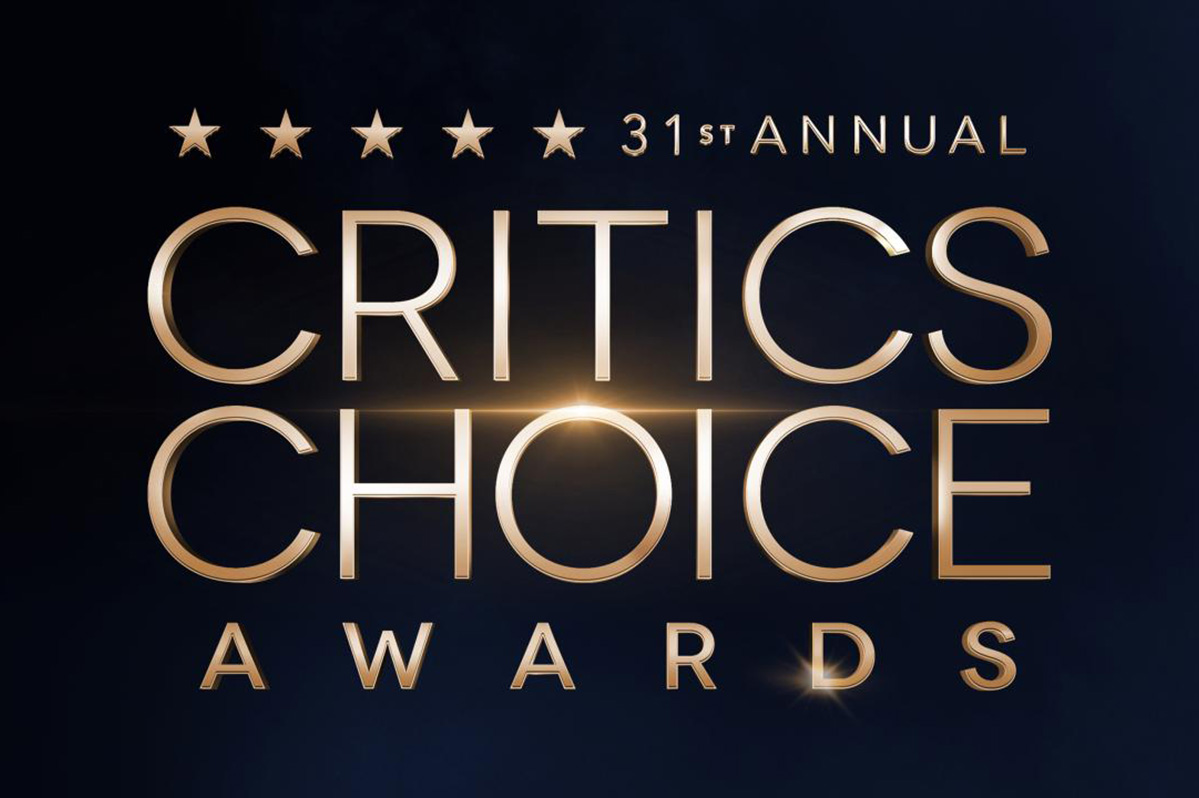
From Chelsea Handler shouting out Heated Rivalry in her opening monologue to Amy Madigan proving that horror performances can (and should) be taken seriously, the Critics Choice Awards provided plenty of iconic moments for queer movie fans to celebrate on the long road to Oscar night.
Handler kicked off the ceremony by recapping the biggest moments in pop culture last year, from Wicked: For Good to Sinners. She also made room to joke about the surprise hit TV sensation on everyone’s minds: “Shoutout to Heated Rivalry. Everyone loves it! Gay men love it, women love it, straight men who say they aren’t gay but work out at Equinox love it!”
The back-to-back wins for Jacob Elordi in Frankenstein and Amy Madigan in Weapons are notable, given the horror bias that awards voters typically have. Aunt Gladys instantly became a pop culture phenomenon within the LGBTQ+ community when Zach Cregger’s hit horror comedy released in August, but the thought that Madigan could be a serious awards contender for such a fun, out-there performance seemed improbable to most months ago. Now, considering the sheer amount of critics’ attention she’s received over the past month, there’s no denying she’s in the running for the Oscar.
“I really wasn’t expecting all of this because I thought people would like the movie, and I thought people would dig Gladys, but you love Gladys! I mean, it’s crazy,” Madigan said during her acceptance speech. “I get [sent] makeup tutorials and paintings. I even got one weird thing about how she’s a sex icon also, which I didn’t go too deep into that one.”
Over on the TV side, Rhea Seehorn won in the incredibly competitive best actress in a drama series category for her acclaimed performance as Carol in Pluribus, beating out the likes of Emmy winner Britt Lower for Severance, Carrie Coon for The White Lotus, and Bella Ramsey for The Last of Us. Pluribus, which was created by Breaking Bad’s showrunner Vince Gilligan, has been celebrated by audiences for its rich exploration of queer trauma and conversion therapy.
Jean Smart was Hack’s only win of the night, as Hannah Einbinder couldn’t repeat her Emmy victory in the supporting actress in a comedy series category against Janelle James, who nabbed a trophy for Abbott Elementary. Hacks lost the best comedy series award to The Studio, as it did at the Emmys in September. And in the limited series category, Erin Doherty repeated her Emmy success in supporting actress, joining in yet another Adolescence awards sweep.
As Oscar fans speculate on what these Critics Choice wins mean for future ceremonies, we have next week’s Golden Globes ceremony to look forward to on Jan. 11.

